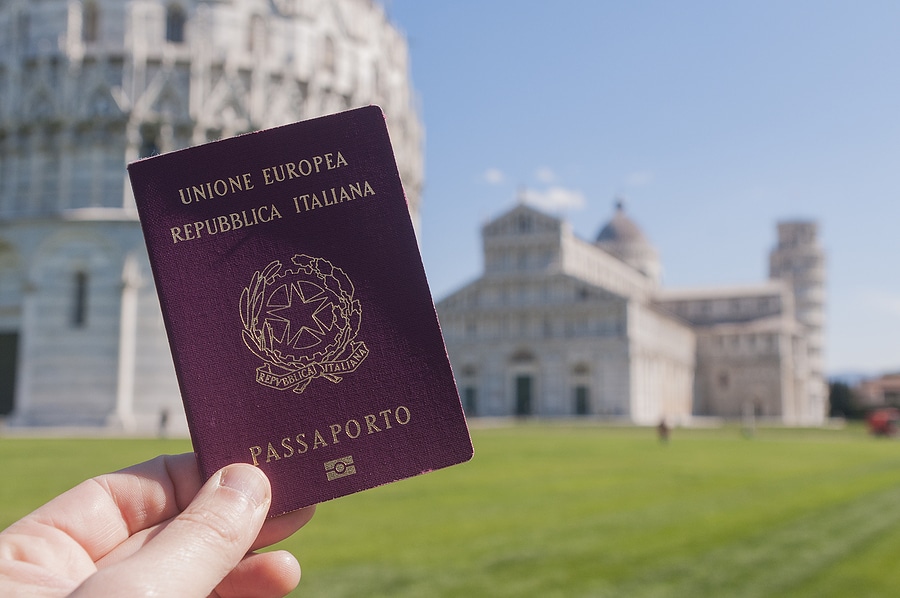
Getting Italian dual citizenship is a game-changer if you’re eyeing a chance to work, live, or study in Europe—or if you’ve always known you were Italian and just want to make it official. With more and more people keen on getting their Italian citizenship through family ties, and considering the amazing perks it brings, it’s important to know what you’re getting into. Check out our fresh and straightforward guide for 2024 that’ll take you through every step to snag that Italian dual citizenship. We’ve packed it with clear, no-nonsense advice to help answer all your burning questions.
So, if you’re a globe-trotting freelancer dreaming of a European base, a parent on the lookout for affordable education options, a retiree planning to spend your golden years soaking up the Mediterranean sun, or you just want to claim your Italian roots in an official capacity, this guide’s for you. Let’s dive in and kick off your adventure to becoming an Italian dual citizen!
Your Italian Heritage: The Key to Dual Citizenship
What Is Italian Citizenship Jure Sanguinis?
Let’s get down to basics.
In Italy, citizenship passes down according to the right of jure sanguinis. This is a Latin term meaning “by right of blood.” Basically, in Italy, it’s not about where you were born, but who you’re descended from. So, as long as you were born to at least one Italian citizen parent – no matter where in the world – then you too are automatically an Italian citizen at birth.
This is different from the jure soli system, which is how citizenship works in the United States. In the United States, it’s not who you were descended from, but where you were born that matters. Even if a child is born to two non-citizen parents, that child is automatically American by virtue of being born on US soil. The two systems can work together, meaning that a person can be both a US citizen jure soli and an Italian citizen jure sanguinis, thanks to his or her heritage.
But Italian citizenship jure sanguinis goes even further.
Italian citizenship passes down from generation to generation even if nobody seeks to officially recognize it. That’s how you can be one, two, three, or even more generations removed from your last Italian-born ancestor and still be an Italian citizen at birth… as long as you meet a few key requirements.
Think of Italian citizenship like a chain: as long as every link (generation) on the chain is intact, the chain can go on forever.
What breaks the chain are the disqualifying factors that we’ll explain in a later section below.

Determining Your Italian Ancestry
It’s not enough to just have an Italian ancestor. You need to know quite a bit of information about him or her.
But what do you do if it’s been 100+ years since that person was born? Some documents may have been lost to time, family lore may be incorrect, or you might not speak enough Italian to go looking for information. Fortunately, there are now more resources than ever to trace your Italian origins, all without leaving your doorstep.
-
Ancestry.com: This is a giant in the world of genealogy with a vast collection of Italian records, including birth, marriage, death, and census records. It’s a great starting point for anyone looking to trace their Italian roots.
-
MyHeritage.com: Similar to Ancestry, MyHeritage has a significant collection of Italian records.
-
ItalianGenealogy.com: This is a fantastic resource for anyone delving into their Italian heritage. It’s a community-driven site where you can get advice, share information, and find guidance on navigating Italian records.
-
Antenati.san.beniculturali.it (The Italian Archives): This website is a portal to Italian state archives, offering digital copies of historical documents, including birth, death, marriage, and military records. It’s a valuable resource for those who want to dig directly into historical Italian documents.
Each of these sites has unique resources and strengths, so exploring multiple platforms can be very beneficial for comprehensive genealogical research.
Qualifying Criteria for Italian Dual Citizenship
Before embarking on your journey toward Italian dual citizenship, understanding the eligibility criteria is crucial. Italian citizenship laws are distinctive and have evolved over the years, making an awareness of these changes essential to avoid unnecessary complications. Here are the key qualifying criteria for Italian dual citizenship:
a) Existence of Ancestor Post-Unification: Your claim to Italian dual citizenship must involve an ancestor who was alive after the unification of Italy on March 17, 1861. This requirement stems from the fact that Italy, as a unified nation-state, did not exist before this date, and therefore, citizenship as we understand it today was not possible.
b) Ancestor’s Naturalization Status: If your Italian ancestor became a citizen of another country (likely your current country of residence), this must have occurred after the birth of their descendant (your direct relative) and after July 1, 1912.
c) Absence of Foreign Citizenship: If your ancestor retained their Italian citizenship (i.e., did not acquire citizenship of another country), you automatically qualify as long as your ancestor was alive after March 17, 1861.
The 1948 Rule: A Crucial Detail in Your Italian Dual Citizenship Journey
There is one other criterion to qualifying that merits its own discussion: the 1948 Rule. This rule is applicable if you have women in your direct line of Italian ancestry.
Understanding the Historical Context
Before January 1, 1948, Italian citizenship was governed by the Italian Civil Code of 1865, which followed the principle of the pater familias. This meant that women could not pass their Italian citizenship onto their children. Instead, the child’s citizenship followed that of the father.
As a result, in almost all cases, a woman could not pass on Italian citizenship to her child. There were exceptions, of course such as…
-
When the father was unknown
-
If the father was stateless
-
When the father’s own (foreign) citizenship didn’t pass on to the child(ren) automatically
With the enactment of the Italian Constitution on January 1, 1948, this rule was abolished. From this date forward, Italian women could pass on their Italian citizenship to their children, aligning with the principle of jure sanguinis – the right of blood, which still governs Italian citizenship today.
Dealing with a 1948 Case
If you have a 1948 case, meaning you trace your Italian ancestry through a female ancestor who gave birth to the next ancestor in line before 1948, your path to Italian citizenship is not blocked, but it does require a different approach. These cases must be pursued through the Italian court system because Italian Consulates will not process these applications administratively.
Success in the Court System
Numerous court cases have challenged the 1948 rule, arguing that it is discriminatory and should not bar descendants through the female line from obtaining citizenship. The courts have generally been favorable towards these arguments. Most notably, the Court of Rome issued a landmark decision in 2009 (the case of Orlandi), in which it agreed that the 1948 rule was discriminatory and should not be applied retroactively.
Following the Orlandi decision, many successful 1948 cases have been pursued in the Italian court system. This success record can be encouraging if you find yourself in this situation. While it may require a bit more effort and time, obtaining Italian dual citizenship is certainly still possible with a 1948 case.
Not a Roadblock, but a Detour
While the 1948 rule introduces an extra step on the journey to Italian dual citizenship, it need not be a roadblock. With careful navigation and expert guidance, this detour can be successfully managed.
If you’re facing a 1948 case, don’t be discouraged. Instead, see this as part of your unique Italian heritage story that you’re uncovering on your journey to dual citizenship. With the right guidance and assistance, Italian dual citizenship can still be within your reach, unlocking a world of opportunities in Italy and across the European Union.

The Impact of Italian Descent on Your Current Citizenship
Firstly, becoming an Italian dual citizen will have no effect on your US citizenship. This goes for Canadian, UK, and Australian nationals as well.
Moreover, your status as an Italian citizen is lifelong and can be passed on to future generations. This creates a lasting legacy for your family, ensuring that the benefits of EU citizenship will be available to your descendants.
Tax Implications of Italian Dual Citizenship
Unlike the United States, Italy does not practice citizenship-based taxation.
That means if you obtain Italian dual citizenship and continue to live and work in your home country, such as the US, you will not need to file or pay taxes to the Italian government. As a non-resident of Italy, you would continue to file your taxes to your resident country as usual, and your Italian citizenship does not change this.
Resident Citizenship: Different Tax Situation
The situation changes if you decide to relocate and start earning income in Italy. As a resident of Italy, you will be subject to Italian taxation laws, which require you to report your worldwide income. However, Italy also has double taxation treaties with many countries, including the US, which are designed to prevent you from being taxed twice on the same income.
The Italian taxation system is complex and can vary significantly depending on your specific circumstances, such as your source of income, the region you live in, and whether you qualify for any deductions or credits. Therefore, it’s advisable to consult a tax professional who is familiar with both Italian and your home country’s tax laws to fully understand your obligations and opportunities.
Italian Dual Citizenship: Benefits and Opportunities
The Freedom of Living in the European Union
With Italian dual citizenship, you unlock the freedom to live in any of the European Union’s member countries. This is not just about the ease of travel; it’s about the right to reside, work, and access public services across the EU. This mobility is a game-changer for professionals seeking diverse career opportunities, students aiming for education at prestigious EU universities, and retirees dreaming of a relaxed lifestyle in the Mediterranean.
This freedom also extends to healthcare and social services, as you’ll gain access to the public healthcare systems within the EU. Additionally, being an Italian citizen means you can participate in the political process, including voting in Italian elections and even running for office. The right to live in the EU is a profound benefit that can significantly enhance the quality of life for you and your family.
Exploring Benefits for Spouses
Spouses of Italian citizens also stand to gain significantly from their partner’s Italian dual citizenship. They may be eligible for expedited or simplified citizenship processes, which can reduce the time and complexity of acquiring Italian citizenship themselves. This spousal benefit facilitates family unity and allows both partners to enjoy the rights and privileges associated with being an EU citizen.
Furthermore, spouses can live in Italy or any other EU country without the need for separate visas or residence permits. They can work without needing additional authorization, access public healthcare, and enroll children in schools with the same rights as Italian citizens. It’s important to note that specific conditions must be met for these benefits to apply, and the process may differ depending on the country of residence and the duration of the marriage.
Nonetheless, the advantages for spouses are clear and can greatly enhance your global mobility and quality of life.
Enjoying the Other Perks of Italian Citizenship
Beyond the freedom to live and work in the EU, Italian citizenship comes with a suite of additional perks. As a dual citizen, you’ll have the right to vote in Italian elections and have a say in the country’s political landscape. You’ll also be able to purchase property in Italy (and Europe) more easily, benefiting from the same rights and potentially more favorable mortgage terms than non-EU citizens.
Additionally, you will have the right to access affordable, world class education and health care. If you have children of college age, they can attend universities in Europe and pay the local tuition rate, which is a fraction of the cost of American higher education.
Italian citizenship can also be a point of pride, allowing you to connect with your heritage and culture on a deeper level. You’ll have access to Italy’s world-class cultural institutions, events, and historical sites, not just as a tourist, but as a citizen with a personal stake in the country’s legacy.
Moreover, for those interested in their genealogical history, Italian citizenship can be a pathway to accessing archival records and discovering more about your family’s past. These cultural and emotional benefits complement the practical advantages of holding an Italian passport.
Legally Solidifying Your Citizenship: Where to Apply
At the Consulate
Applying at the nearest Italian consulate is the most common path people take when seeking recognition of Italian dual citizenship. The consulate serves as your bridge to the Italian government, helping to sort out your application. To kick things off, you’ll need to score an appointment, which can sometimes mean playing the waiting game due to lots of people having the same idea.
Once your appointment comes around, be ready to hand in a stack of paperwork and any translations or apostilles that are needed. The consulate’s job is to go through your documents with a fine-tooth comb to make sure everything’s in line with what Italian citizenship law demands. We’ll explain in a later section the exact documents you will need.
Getting your documents spot-on is crucial because any mix-ups or gaps can slow things down or even cause your application to be binned. Teaming up with experts in Italian citizenship can make a big difference, helping you get everything straight for a smoother ride and a better shot at getting your application through the consulate approved.
Directly in Italy
Some individuals may choose to apply for Italian dual citizenship directly in Italy. This option can be faster than consulate applications, as local municipalities (comuni) may have shorter processing times. To apply in Italy, you must establish legal residency in the municipality where you intend to submit your citizenship application. Note that you do not need to apply where your ancestor was from. Rather, you can choose to elect residency in any one of Italy’s 8,000+ comuni.
Once you have established residency, you will need to present the same comprehensive set of documents required by the consulate. This includes vital records, proof of Italian ancestry, and any additional legal documents. Local officials will then verify your documents and lineage before moving forward with your citizenship recognition.
Applying in Italy requires a good understanding of the Italian language and legal system, as well as the ability to stay in the country for an extended period. For these reasons, seeking assistance from experts who can navigate the local bureaucracy and communicate effectively with municipal officers can be a significant advantage.
At a Court
For certain cases, the path to Italian dual citizenship may involve legal action, and applying through a court might be necessary. This is typically the case when dealing with discrepancies in documents, uncooperative consulates, or when challenging the 1948 Rule—a limitation for those claiming citizenship through a female ancestor who gave birth before 1948.
Legal proceedings are conducted in Italy, and applicants are represented by an Italian attorney who specializes in citizenship cases. The court has the authority to recognize your right to Italian citizenship and can order the registration of your vital records in Italy.
Taking the judicial route can be a powerful solution for overcoming obstacles that cannot be resolved through administrative means. Engaging with legal experts who have a track record of success in such cases can significantly enhance your chances of obtaining citizenship through the court system.
From Eligibility to Document Completion: Putting it All Together
What Documents Will You Need?
To apply for Italian dual citizenship, you must submit a comprehensive set of documents to substantiate your claim. Essentially, the goal is to recreate your family tree in the form of various vital records in a direct line from you to your Italian-born ancestor.
These typically include your birth certificate, marriage certificate (if applicable), and divorce certificate (if applicable). You’ll also need, at a minimum, the birth and marriage (and divorce) certificates of every person in the generations leading back to your Italian-born ancestor. In some cases, you will also need death certificates where applicable.
Additionally, you will need to provide proof of your Italian ancestor’s citizenship status, such as their Italian birth certificate and evidence that they did not naturalize before the birth of their descendants in your line (or proof they did not naturalize at all).
The exact documents you need may vary based on your family history and the consulate’s or municipality’s requirements.
All documents must be in long-form and include apostilles and official translations. Ensuring the accuracy and completeness of these documents is critical, as any errors can lead to delays. Professional services can help you accurately prepare and review all necessary documentation.
To find out the exact set of documents you will need, we recommend visiting your local consulate’s website. Each of them provide a comprehensive breakdown of the records required, which you can consult at your leisure.
Where to Obtain the Documents
Securing the correct documents for Italian dual citizenship involves contacting various agencies both domestically and in Italy.
In the United States, for example, birth, marriage, and death certificates can typically be obtained from the vital records office in the state where the event occurred. For documents from Italy, you’ll need to reach out to the relevant comune(municipality) where your ancestor was born, married, or died.
Naturalization records can be sought from the National Archives and/or USCIS if your ancestor became a naturalized U.S. citizen. These records may also be held at the county level, depending on when and where your ancestor became a US citizen.
Should your ancestor have never naturalized, you will need to substantiate this fact. At a minimum, you will need a ‘Letter of No Record Found’ from the National Archives and a ‘Certificate of Non-existence’ from USCIS. Important: get your CoNE requests in soon, because as of April 1, 2024, the fees are going up!
Depending on your consulate’s instructions you may also need to provide letters of no record found from the counties in which your ancestor lived, and also possibly certified copies of census records showing alien status.
Due to differences in record-keeping practices and legal requirements, obtaining these documents can be time-consuming and may require specific requests or forms. Expert assistance may be invaluable in navigating these processes efficiently, ensuring that the documents obtained meet the stringent requirements of the Italian authorities.
Italian Translations
All non-Italian documents submitted for Italian dual citizenship must be accurately translated into Italian. This step is crucial because any mistake in the translation could lead to misunderstandings or rejection of your application. Translations must be complete and precise, mirroring the original document’s format and content.
Though anyone can translate these records into Italian, it is advisable to use professional translators who know the specific terminology and requirements of Italian citizenship applications. Some consulates or municipalities may also require that translations be certified to verify their accuracy.
Remember, the translation is not just about converting words from one language to another; it’s about ensuring that the intent and legal implications of each document are clearly understood by Italian officials.
Apostilles and Legalizations
Non-Italian documents cannot be accepted for use in Italy as-is. So, before the consular (or court, or comune) worker will even look at your records, they must also have something called an apostille which lets them know that the document is a valid, legal one.
In short, an apostille is a form of unified authentication for use on documents hailing from countries that participate in the Hague Convention of 1961. The apostille certifies the legitimacy of the document and the authority of the official who signed it.
To obtain an apostille in the United States, you must submit your documents for legalization to the state that issued them. Each document must be the long-form version and carry the official seal and signature of the issuing authority. It’s essential to follow the specific guidelines provided by the state office, as requirements can vary.
Making an Appointment
Once your have assembled, translated, and legalized your documents, the next step is to make an appointment with the Italian consulate or embassy that serves your jurisdiction. This appointment is when you will formally submit your application for Italian dual citizenship.
It’s important to be proactive and schedule this appointment well in advance. Consulates often have long waiting lists. It is not rare to book appointments a year or more into the future. Check the Prenot@mi website regularly for appointment openings and get ready to book as soon as a slot becomes available.
When the day of your appointment arrives, ensure all your documents are organized and ready to present. Preparedness can streamline the process and make a positive impression on the consulate staff. While the wait for an appointment may be long, thorough preparation can help expedite your application once you have the opportunity to submit it.
Filing the Application and Becoming an Italian Citizen
What Happens When You File for Italian Dual Citizenship?
After you submit your application for Italian dual citizenship, the consulate or local municipality begins the process of verification and assessment. They will meticulously review your documents to ensure they meet all the legal requirements and verify your lineage back to your Italian ancestor.
After acceptance, your application enters a queue for processing. This timeframe can vary depending on the consulate’s workload and the complexity of your case. During this period, the consulate may reach out to you for additional information or clarification regarding your documents.
The consulate then forwards the approved application to the relevant Italian municipality, which will transcribe your vital records, officially recognizing you as an Italian citizen. This step is crucial as it is the actual granting of citizenship status. After registration, you will be notified of your new status and can begin enjoying the rights and responsibilities that come with being an Italian dual citizen.
Waiting for Recognition
The waiting period for recognition of Italian dual citizenship can be one of the more trying stages of the process. After all, the Italian government has up to 24 months to process your application.
The duration of your exact wait depends on numerous factors, including the volume of applications at the consulate and the efficiency of the Italian municipality handling your registration, as well as any uncertainties or discrepancies in your documents requiring clarification.
During this time, it’s important to remain patient. The consulate will reach out to you with questions if there are any issues with your application.
While waiting, you can use this time to further immerse yourself in Italian culture, language, and heritage. Being proactive in this way can help you integrate more smoothly once you’re a citizen and make the wait feel more productive. It’s also advisable to keep copies of all correspondence and submissions in case you need to reference them later.
After You Become Recognized: Certificate Transcriptions, AIRE Enrollment, and Italian Passports
Once your become an Italian dual citizen, there are a few administrative steps to finalize your status.
First, the relevant Italian municipality must transcribe your records in their civil register. This process includes your birth certificate and, if applicable, marriage and children’s birth certificates. This transcription is a declaration of your citizenship and an official record in Italy.
Next, you’ll need to enroll in AIRE (Registry of Italians Residing Abroad) at the consulate. AIRE registration is mandatory for Italian citizens living abroad and is crucial for various administrative processes, like renewing your passport or voting in Italian elections. If you apply at a consulate, they will usually enroll you in AIRE automatically.
Finally, you can apply for your Italian passport, which is the tangible proof of your Italian citizenship and provides you with the freedom to travel, live, and work within the EU. The passport application will require additional documentation, photos, and fees, so it’s important to prepare accordingly.
With your passport in hand, your journey to Italian dual citizenship comes full circle, and a new chapter of opportunities begins.
Two-Passport Travel
Having Italian dual citizenship means you can travel with two passports, an advantage that offers flexibility and convenience. With an Italian passport, you can enter many countries without a visa or receive a visa upon arrival. This benefit greatly simplifies travel, especially throughout the European Union, where you can move across borders with ease.
When traveling, use your Italian passport when entering and leaving the EU to take advantage of EU citizens’ lanes, which often have shorter queues. For travel outside of the EU, determine whether your Italian or other passport provides the best travel benefits for your destination.
Remember to maintain valid passports from both countries and be aware of each country’s entry and exit requirements. Navigating international travel with two passports can be straightforward when you understand the rules and privileges that come with each citizenship. This ability to traverse the globe more freely is one of the many rewards of Italian dual citizenship.

Ready to Unlock Your European Dream? Let’s Start!
Importance of Professional Assistance in the Citizenship Process
Navigating the Italian dual citizenship process can be complex and time-consuming. Professional assistance is invaluable in ensuring that the journey is as smooth and efficient as possible. Experts in the field can help you understand the intricate legalities, gather the correct documentation, and guide you through the application steps, avoiding common pitfalls that could delay or derail your application.
Consultants like us who specialize in Italian citizenship can provide tailored advice based on your unique circumstances. We stay up-to-date with the latest legal changes and consulate requirements, which is crucial for a successful application. Our experience with the Italian legal system and bureaucracy can significantly expedite the process, saving you time and effort.
Moreover, professional assistance can help prepare and organize your documents, handle translations and apostilles, and even represent you in legal proceedings if necessary. This support can make the difference between a stressful experience and a seamless transition to dual citizenship.
Why Choose Our Trusted Services?
Choosing our trusted services for your Italian dual citizenship application means you’re opting for reliability and expertise. Our team of seasoned professionals understands the complexities of Italian law and the detailed documentation process. We take pride in providing a personalized approach, carefully evaluating each client’s case to ensure the highest chances of success.
We understand that each citizenship journey is unique, and we’ll help navigating the nuances of your ancestral history. Our services include thorough document retrieval, accurate translations, and expert preparation of your application. We also maintain open communication, keeping you informed every step of the way.
Our commitment to excellence is evident in our track record of successful applications and satisfied clients. By choosing us, you’re not just getting a service provider; you’re gaining a partner who is as invested in unlocking your European dream as you are.
Contact Us: Your Italian Dual Citizenship Awaits
Taking the first step towards Italian dual citizenship is a significant milestone, and we’re here to assist you on this exciting journey. Our team of experts is ready to evaluate your case, provide comprehensive support, and guide you through the entire process until you achieve your goal of becoming an Italian citizen.
We invite you to contact us to discuss your eligibility and to learn more about our end-to-end consulting services. Our personalized approach ensures that we tailor our services to meet your specific needs, making the process as straightforward and stress-free as possible.
Your dream of living, working, and enjoying the rich cultural heritage of Italy and the European Union is within reach. Reach out today, and let us help you unlock the door to your European future. Your Italian dual citizenship awaits.

